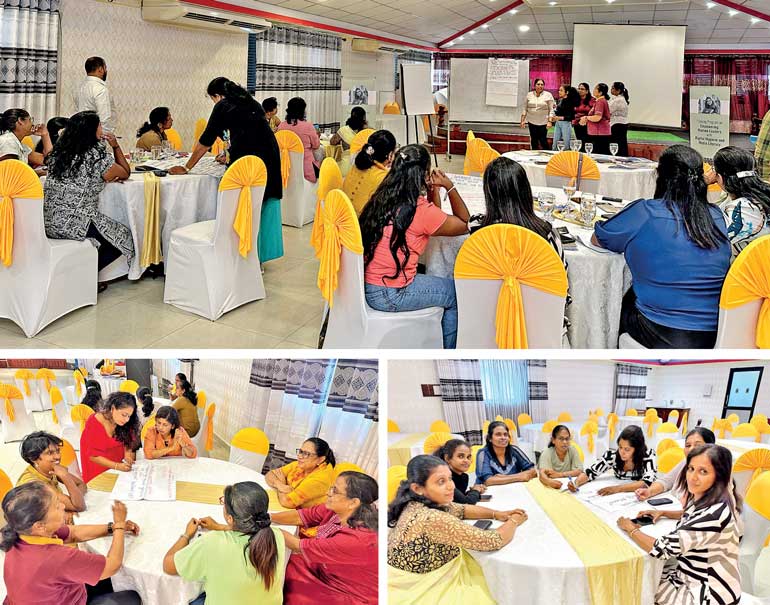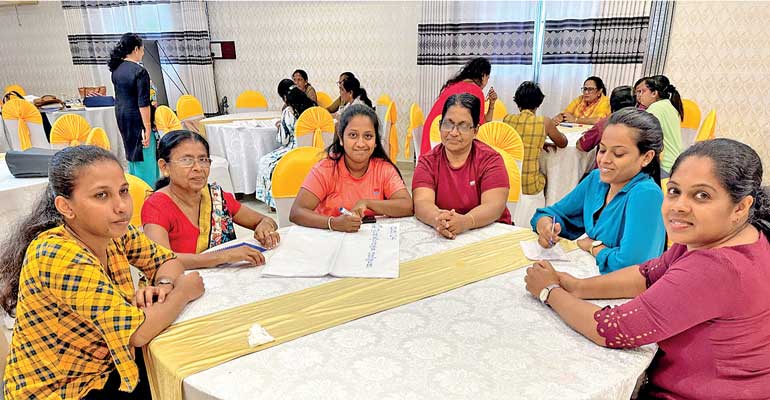Wednesday Feb 25, 2026
Wednesday Feb 25, 2026
Thursday, 10 April 2025 00:32 - - {{hitsCtrl.values.hits}}


 At least 30 women politicians associated with different political parties at the local government level from two districts—Ratnapura and Kegalle—came together to discuss the digital threats they experience in their daily political careers due to their gender. This gathering was held in Ratnapura from 4-6 March. It was a unanimous consensus that every woman who participated in this event agreed that all of them are concerned about cyber gender-based violence, and that digital threats are on the rise.
At least 30 women politicians associated with different political parties at the local government level from two districts—Ratnapura and Kegalle—came together to discuss the digital threats they experience in their daily political careers due to their gender. This gathering was held in Ratnapura from 4-6 March. It was a unanimous consensus that every woman who participated in this event agreed that all of them are concerned about cyber gender-based violence, and that digital threats are on the rise.
When discussing the various digital threats they experience in their political careers, gendered disinformation was identified as a major issue. False news and fabricated information, manipulated images, video and audio clips, and misleading narratives are often used to discredit women. These false allegations, which often centre on their personal lives, morality, or relationships, circulate widely and damage their public image. This has a larger societal and political impact on their careers.
In addition, women discussed various digital threats they faced. Doxxing and privacy violations further endanger women politicians, as their personal details—such as home addresses and phone numbers—are leaked online and shared in public networking groups and WhatsApp groups. In many cases, such as in Matara and Ratnapura, it was also noted that women politicians often shared some personal information on social media. When questioned, they would say there is nothing to hide, as everyone knows everything. Our telephone numbers, NIC numbers, home addresses, dates of birth, etc., are almost everywhere. These international NGOs have them; Grama Niladharis, development officers, agricultural officers, local NGOs, even shop owners, pharmacies, and private companies have them.
Social media manipulation and trolling are systematic, with organised groups using comment sections and direct messages to spread hate speech and harassment. Women indicated that hacking and impersonation also pose significant risks, as attackers gain unauthorised access to their social media accounts. Many women checked if their email accounts had been compromised, and luckily, very few had been. Cyberbullying, including making sexual comments, was also highlighted as a major threat. The psychological impact of cyberbullying is profound, leading to anxiety, stress, and self-censorship. Election-related digital threats, such as fake endorsements and misinformation campaigns, further manipulate public perception. Addressing these challenges requires stronger digital protections, legal frameworks, and collective efforts to combat online violence against women politicians, not just a series of isolated trainings.
Women also discussed why gendered disinformation is directed towards them. They noted that the primary focus is to silence women in politics. Many women pointed out that some men do not want to see women in higher political positions, making decisions and holding power. Some men, both within their own political camps and from opposing parties, do not want to be led by women, fearing they will question illegal and unethical political and development activities. Some men, by default, hate women and believe that power should belong to men. Many women said most men do not want to see women in the public sphere, whether as civil servants or in leadership roles. Sometimes, even men within their own parties do not view women as competitors. Therefore, gendered disinformation is used as a weapon to compromise public trust, silence women, discredit their good work, assassinate their character, and undermine their trustworthiness.
This three-day gathering was organised by the Campaign for Free and Fair Elections (CaFFE) in partnership with The Carter Center. The ongoing CaFFE programs aim to capacitate 120 women in local government bodies as champions of digital safety, hygiene, and media literacy so they can effectively navigate digital threats and all forms of media narratives, including misogynistic sentiments aimed at silencing them in politics.
During this three-day gathering, women participated in serious experience-sharing sessions and short trainings, where they shared several experiences of dealing with harmful gendered disinformation. They explained the social, political, mental, and psychological challenges they have faced. It is important to note how the women in the group dealt with such challenging experiences. Below are some of the case studies shared by women political leaders working on the ground.
Case Study 1: Digital misogyny
The first group of women (names protected) shared experiences of misogynistic actions by fellow party members and supporters. “I was a member of a political party attached to the Pradeshiya Sabha (region is protected). In my location, a member of the ruling party was engaged in a development activity in my village. Apparently, I was a member of the opposition party. During this development activity by my fellow politician, a man from the ruling party, I supported them. I welcomed the member on behalf of the people in the village and stayed with him while launching the developmental activity. Obviously, it was supposed to be a developmental activity benefiting the community. I wanted to show solidarity with the ruling party member and also appreciate the development activity they were planning,” a woman shared.
When she explained her case, it was noted that some people took photographs of her closely working with the ruling party member and widely circulated them among her party members. Supporters brought this issue to the Pradeshiya Sabha as well. Members and supporters expressed anger and frustration over her being with the ruling party member. Party members and supporters severely criticised her, degrading her and speaking poorly about her character. Some went so far as to say that she had no policy to follow and would go behind every man. On one hand, this campaign made her popular, but on the other, she was frustrated that her intention was not appreciated—not only by her supporters but also by party members. Her family members and supporters criticised her harshly, accusing her of crossing over to the ruling party.
During meetings at the Pradeshiya Sabha, political party members, particularly men, shouted at her and criticised her severely for aligning with the ruling party. She explained, “I am a female politician, and I want to be a role model for everyone. I cannot discourage political and developmental activities if they benefit the people. I just wanted to be there as a public representative, and I don’t want to politicise everything that benefits the community.”
However, the rapid spread of the incident on social media and WhatsApp emotionally affected her. She was very upset and shocked to see people making cheap political commentary about an important event. She knew this happened because of the misleading way the picture was posted on social media. However, her family and some party members supported her and encouraged her to remain confident in facing the situation.
She went on to say, “When ruling party members bring development activities for the people on the ground, particularly in village communities, you can’t always see the political differences. You can see the gender differences. You need to be open to welcome anything that benefits people.”
Case Study 2: Character assassination
Another woman candidate from a municipal council (name protected), belonging to a major political party (name protected), faced a similar situation. A group of political opponents widely circulated an old picture of her with a male colleague, claiming she was having an affair with him. However, this picture had been taken long ago. The old image was re-circulated with a new, misleading narrative to tarnish her political image and compromise her credibility. The campaign even escalated to false rumours, alleging that she was in relationships with multiple men at the same time.
This false narrative spread not only on social media but also on WhatsApp, generating heated discussions. The post highlighted that she was having an extramarital affair with her old male friend. Her character was criticised, with some comments saying she was immoral and lacked family values. Some even commented that this is why women should not be allowed in politics. She was shocked to see this and knew it was orchestrated by her political enemies, particularly her male colleagues, who could not tolerate her progress in politics. They wanted to silence her, so they used the picture to discredit her.
The incident affected her deeply. She was very upset and found it difficult to face her family, friends, relatives, and supporters. Everyone started questioning her, and she couldn’t explain herself to hundreds of people. If it had been just one or two, she could have defended herself, but the overwhelming scrutiny left her unable to respond.
She refused to let her reputation be destroyed on social media, so she stayed firm and continued engaging in public activities. She kept posting on social media, visited villages, and met with people. She projected confidence, as if the incident had not affected her, even though internally, she was deeply hurt. This case study was shared by a participant who belonged to the Kalutara Urban Council.
Case Study 3: Compromising blic trust
Another case involved a female political candidate from Ratnapura. A fake Facebook account was created against her by unknown parties, portraying her as a fortune teller, a folk dancer, and someone involved in funeral rituals. Numerous posts on that page falsely claimed she was taking money from supporters and other sources for her political career. These posts were designed to highlight the woman politician’s poor social value and status, aiming to undermine her credibility as a politician.
The affected politician shared her experience in dealing with this attack. She stated, “I have always been involved in social service. Whenever people needed help, I tried to find ways to assist them. Because of this, I became popular in schools, religious centres, farmer communities, and youth groups. However, someone must have wanted to stop me from doing this and created the fake account to damage my reputation.”
Unfortunately, some of the posts were so convincing that even some of her supporters believed them. However, she remained firm in cyberspace and did not let it discourage her. She publicly challenged those spreading false accusations, asking for evidence of any fraudulent activities. When no evidence was provided, she used their silence in her favour to prove her innocence.
She continued posting on her own social media platforms and refused to remove the fake account. She wanted to leave a legacy showing that she had the courage to fight back against those who created fake accounts. “I didn’t even care about them,” she said.
Luckily, she had a strong support system—her family, the police, and her party trusted her, except for a few individuals. Through this experience, she understood the importance of women politicians having the ability to debunk false narratives.
However, she also recognised a darker reality: “Unfortunately, when we try to counter false accusations, anonymous strangers behind fake narratives continue to generate more lies, directing the discussion into an unhealthy environment. This kind of mental torture left me sleepless for more than three days. I was in shock and deeply upset, but I somehow managed to stay strong.”
Case Study 4: Extension of offline patriarchy
The final case study involved another female politician from Ratnapura (name and party protected), who faced a constant social media campaign, particularly on Facebook and WhatsApp. She was a member of a political party and had secured a significant number of votes, surpassing many male politicians who had been in politics for years. However, within two years, she faced continuous online attacks accusing her of corruption.
Several social media posts claimed she had bought a new vehicle and built a house with illicit money. Some posts even alleged that she had taken money from political party supporters.
Participants who discussed this case noted that while some allegations might have had a grain of truth, nothing was ever proven in a court of law. However, the sheer volume of social media attacks forced her into silence. She couldn’t counter the false narratives, and as a result, she lost her political charisma. Eventually, she was removed from party membership.
Fellow women politicians supported her by writing a letter defending her innocence and encouraging her to face the inquiry called by her party. However, due to her mental state, she couldn’t bring herself to do so, and ultimately, she had to leave politics.
The group analysing this case stated: “We are not necessarily supporting or opposing the allegations discussed on social media. But what we want to highlight is that if this had been a male politician, the online campaign wouldn’t have been this intense. She was targeted because she was a woman, gaining popularity, and playing a major role in a well-known political party. Many men saw this as the best opportunity to completely remove her from politics—and they succeeded.”
Speaking about this initiative, CaFFE Director Manaz Makeen indicated that it is unfortunate that women have to go through digital threats amidst the many battles they face in their political careers. It is important for political parties, election monitoring bodies, the Election Commission, and other related state bodies to work together to ensure that our women politicians are protected in the digital sphere.
The Carter Center Program Manager Manjula Gajanayake endorsed Manaz, saying, “It is important that political parties take this seriously to ensure that there is party-level intervention to make sure that women are safe and secure in the digital sphere.”
Conclusion
These case studies highlight the importance of a coherent strategy to protect women in the digital sphere. The experiences of these women make it clear that solutions should go beyond just training. One factor often overlooked is mental wellbeing support for women who experience digital threats. This should be established at multiple layers of protection within political parties and ministries. These experiences also demand a party-level and state-level systemic approach, including tech mentorship, mental support, ongoing coaching, and a rapid support system.
Additionally, the Election Commission and election monitoring bodies must remain vigilant about the growing nature of these threats. These bodies can establish a system where the digital safety of women politicians is constantly assessed, analysed, and trends understood, to build a firm system. Ongoing discussions and capacity-building initiatives are highly needed. These cases also demonstrate the need for engaging big tech companies as part of the solution.
The experiences shared by the women in these case studies highlight the increasing and pervasive digital threats faced by women politicians in Sri Lanka. From gendered disinformation and online harassment to privacy violations and cyberstalking, these threats undermine their credibility, safety, and political participation. Despite the challenges, many of these women showed resilience by continuing their public activities, defending their integrity, and striving to remain a voice for their communities.
However, the emotional and psychological toll of these attacks is undeniable, as these women are often left to navigate a hostile digital environment alone. To foster an environment of gender equality in politics, it is essential to address the digital violence that targets women politicians. This requires strong legal frameworks, digital protections, and collective efforts to create a safe and supportive space for women in politics, ensuring their voices are heard and their contributions valued.
(The writer is a media researcher and academic specialising in journalism studies. He currently holds the position of head of program at the Foundation for Advancing Critical Thinking in South Asia. Throughout his career, he has shared his knowledge and expertise as a visiting lecturer at renowned local universities such as the University of Peradeniya, University of Vocational Technologies, University of Colombo, KIIT University in India, and the University of Jaffna. His doctoral research focused on broadcasting policy within South Asian countries. Additionally, he worked for over 10 years at the Sri Lanka Broadcasting Corporation (SLBC) as a relief announcer, commentator, and news reader. He could be reached via email at [email protected].)